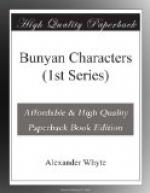of the countryside also.’ Jonathan Edwards
called Thomas Boston ‘that truly great divine.’
I am not such a judge of divinity as Jonathan Edwards
was, but I always call Boston to myself that truly
great pastor. But my lazy and deceitful heart
says to me: No praise to Boston, for he lived
and did his work in the quiet Forest of Ettrick.
True, so he did. Well, then, look at the populous
and busy town of Kidderminster. And let me keep
continually before my abashed conscience that hard-working
corpse Richard Baxter. Absolutely on the same
page on which that dying man enters diseases and medicines
enough to fill a doctor’s diary after a whole
day in an incurable hospital, that noble soul goes
on to say: ’I preached before the wars
twice each Lord’s Day, but after the wars but
once, and once every Thursday, besides occasional
sermons. Every Thursday evening my neighbours
that were most desirous, and had opportunity, met at
my house. Two days every week my assistant and
I myself took fourteen families between us for private
catechising and conference; he going through the parish,
and the town coming to me. I first heard them
recite the words of the Catechism, and then examined
them about the sense, and lastly urged them, with
all possible engaging reason and vehemency, to answerable
affection and practice. If any of them were stalled
through ignorance or bashfulness, I forbore to press
them, but made them hearers, and turned all into instruction
and exhortation. I spent about an hour with
a family, and admitted no others to be present, lest
bashfulness should make it burdensome, or any should
talk of the weakness of others.’ And then
he tells how his people’s necessity made him
practise physic among them, till he would have twenty
at his door at once. ’All these my employments
were but my recreations, and, as it were, the work
of my spare hours. For my writings were my chiefest
daily labour. And blessed be the God of mercies
that brought me from the grave and gave me, after
wars and sickness, fourteen years’ liberty in
such sweet employment!’ Let all ministers who
would sit at home over a pipe and a newspaper with
a quiet conscience keep Boston’s
Memoirs
and Baxter’s
Reliquiae at arm’s-length.
3. Our young communicants’ classes, and
still more, those private interviews that precede
and finish up our young communicants’ classes,
are by far our best opportunities as pastors.
I remember Dr. Moody Stuart telling me long ago that
he had found his young communicants’ classes
to be the most fruitful opportunities of all his ministry;
as, also, next to them, times of baptism in families.
And every minister who tries to be a minister at
all after Dr. Moody Stuart’s pattern, will tell
you something of the same thing. They get at
the opening history of their young people’s
hearts before their first communion. They make
shorthand entries and secret memoranda at such a season
like this: ’A. a rebuke to me. He




